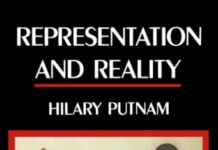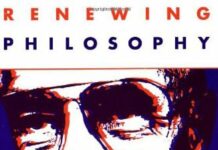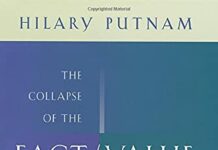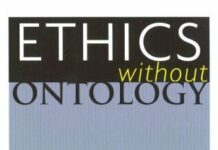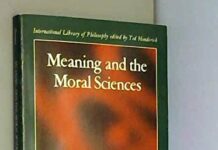
Ebook Info
- Published: 1981
- Number of pages: 236 pages
- Format: PDF
- File Size: 9.25 MB
- Authors: Hilary Putnam
Description
Hilary Putnam deals in this book with some of the most fundamental persistent problems in philosophy: the nature of truth, knowledge and rationality. His aim is to break down the fixed categories of thought which have always appeared to define and constrain the permissible solutions to these problems.
User’s Reviews
Reviews from Amazon users which were colected at the time this book was published on the website:
⭐This book was a page-turner from beginning to end. I could not put it down. It’s not an easy read (is philosophy ever easy to read?) but it made me think a lot, and to rethink what I used to think. I loved this book and highly recommend it.
⭐… truth discovery) and our conceptual schemes entail value judgements (which in turn change as our knowledge expands).These seem to be key “take aways” (at least on my reading).I give this book a 4 star rating because it has helped me clarify my ideas about truth, rationality and values. That said, I am not a philosopher nor a student of philosophy. I am merely an interested reader. So I may not be sufficiently familiar with the relevant literature to give an objective review of this book.
⭐Satisfied with the product
⭐Hilary Putnam, who died last year at eighty-nine, had a career that spanned both historical milestones and competing philosophical “paradigms”. The first analytic philosopher hired by the Princeton philosophy department, Putnam was a wunderkind who refined the philosophy of science of his teacher Hans Reichenbach, developed the position in philosophy of mind known as “functionalism” (often explained — including in the book being reviewed — by the analogy “the mind is to the brain as software is to hardware”) and helped solve Hilbert’s Tenth Problem in mathematics to boot. In the ’70s Putnam developed a revolutionary new approach to the philosophy of language, generally known as “externalism”: this is the view that “meaning ain’t in the head”, that facts “out there” in the world, not only what we intend to express, are actually constitutive of what our thoughts and words can mean.Around 1980, as his period of activism with the “Progressive Labor Party” came to an end, Putnam delivered a shocker: he was now hostile to the pro-scientific method views of his youth, which he termed “metaphysical realism”. (At this time a few thinkers from the analytic tradition were beginning to question its fundamental principles, chief among them Richard Rorty, but Putnam was a highly unlikely radical in this respect.) *Reason, Truth and History* is his 1981 book-length treatment of the topic, and whatever your take on Putnam’s “changes of heart” (which continued for the next 35 years) it is truly worthwhile; well-written and carefully balanced, Putnam tackled many of the most burning questions in philosophical discourse with an approach that is open-ended and magisterial at the same time.Putnam’s alternative to “metaphysical realism” is not quite given a name in the book, but (through what he protested was a misreading) it has come to be called “internal realism”. Unlike Rorty and the “far left” of philosophical analysis, Putnam had absolutely no desire to give up on Reason, Truth, or History; however, he methodically lays out the argument that contact with reality can not be had in what John McDowell calls the “sideways-on” mode, as a rapport external to our worldview and canons of rationality. In reflections on language, mind, culture and ethics Putnam deploys many well-wrought arguments to the effect that traditional ways of “grounding” discourse in some unimpeachable font of reality simply cannot work. We cannot get outside our values (both ethical and “epistemic”) in researching fact; without them, we would have no facts worth mentioning available at all.The book, in a mode somewhere between a monograph and a lecture series, did not present “knock-down” arguments that gave a definitive cast to the journal literature, but this means for someone with serious but non-professional philosophical interests (or a student trying to get “the lay of the land” regarding brains in vats and other usually underdescribed landmarks of philosophical argument) reading it will be a wise choice.
⭐This is a review of Reason, Truth and History by Hilary Putnam.Hilary Putnam (born 1926) is one of the leading philosophers in the English-speaking world in the 20th (and early 21st) century. He is in the “analytic” philosophical tradition, which emphasizes rigorous argumentation and incorporating into philosophy the insights of science and mathematics, so his work is sometimes technical. This book is a combination of ingenious but difficult arguments (there is an appendix that contains a formal mathematical proof of one of his claims) with much more readable discussions of issues of general philosophical interest. I have met Putnam in person, and this book gives you a feel for what he is like: brilliant, intellectually broad and quick, but sometimes a bit glib.Putnam has fundamentally changed his philosophical views several times. (He published this book in 1981.) But you will get a taste of his most famous claims from this work. There is a warning on p. viii that many readers may want to begin with Chapter 5 (a non-technical chapter). This is good advice. I am a professional philosopher, and even I found my eyes glazing over at points in Chapters 1-4.Overall, you can see Putnam as *rejecting* the following common conception. The content of the meanings of our words and our beliefs is given by something internal to our minds or brains. Our beliefs are true just in case they “correspond” to a world that is completely independent of our beliefs. Science is the best (and perhaps the only) method for determining the correspondence between beliefs and the world. Science can “prove” its claims via a strict, logical scientific method. Ethics and values are subjective matters of opinion, since they are not proveable like science.Putnam is similar to many critics (including Thomas Kuhn, Paul Feyerabend and the so-called “postmodern” philosophers) in recognizing that the picture given by the preceding paragraph must (and I mean MUST) be mistaken. The content of our beliefs and concepts is determined, in part, by things external to them (Chapter 1). There is no way to make sense of concepts and beliefs corresponding to the world, at least not if we think of the world as completely independent of our mental states (Chapter 2). The methodology of science cannot be reduced to formal logic and mathematics (Chapter 8). Fact and value cannot be neatly separated (Chapter 6).However, Putnam diverges from many “postmodernists” in rejecting relativism and wanting to maintain some notions of truth and rationality. His basic move is to say that we can continue to ask questions like “What is real?” “Is theory A more rational than theory B?” and “Is X true?” but we can only ask them internally to our theories. Putnam argues that this does not land us in relativism or chaos because we are committed (by the very nature of our human practices) to treating other humans as rational in a way that is comprehensible to us (even if we end up disagreeing with them). In short, to treat someone as a “person” is to treat them as potentially disagreeing with us, but as disagreeing with us about the same world, and disagreeing in way that we can understand (and hence rationally argue with).Overall, if you are going to read only one work by Putnam, I would recommend this one. But if you have not read any analytic philosophy before, be prepared to skim parts.
⭐Better than promised
Keywords
Free Download Reason, Truth and History (Philosophical Papers (Cambridge) Book 3) in PDF format
Reason, Truth and History (Philosophical Papers (Cambridge) Book 3) PDF Free Download
Download Reason, Truth and History (Philosophical Papers (Cambridge) Book 3) 1981 PDF Free
Reason, Truth and History (Philosophical Papers (Cambridge) Book 3) 1981 PDF Free Download
Download Reason, Truth and History (Philosophical Papers (Cambridge) Book 3) PDF
Free Download Ebook Reason, Truth and History (Philosophical Papers (Cambridge) Book 3)
